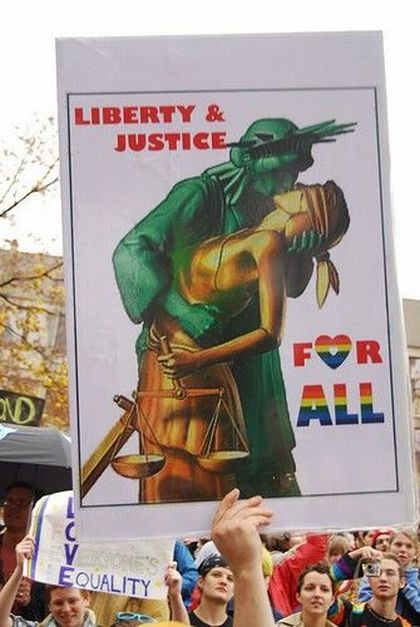Apart from his blinders on campaign finance, Feingold was a very strong civil libertarian, and the one Democrat I proudly voted for this election.
My regret for his loss this cycle will be second only to that of Prop 19.
Marc Ambinder
attempts to explain the loss:
Start from the sociological point: beer. Milwaukee. The Tavern League is a huge lobbying force. The Democratic base in the state is compromised of what Ron Brownstein calls "beer track Democrats": blue collar voters, ethnic whites who tolerate government when it helps but recoil from it when it seems intrusive and wasteful. They tend to be older. Sporadic and infrequent Democratic voters in the state come from the university towns like Madison. Wisconsin has had an unusually high rate of young voter participation, a trend that dates back to the mid-90s. People forget that Barack Obama won the state in the primaries, and that Democrats since Michael Dukakis have kept it in the blue column in presidential races. It's hard to argue that voters in Wisconsin are Democrats simply by habit. But at the same time, Democrats took back the state legislature only last year, and Feingold has never been reluctant to admit that he takes positions that are somewhat out of sync with his state. But culturally, he's one of them. Balanced budgets. Gun rights. And a beer drinker.
Younger college-town Democrats and older habitual Democratic voters are clashing this year on entitlement spending; younger Democrats see the health care reform law and the stimulus package as down payments on their future. Older Democrats see it as a waste of money. This trend plays itself out
culturally, too.
Beer-track Democrats tend to be the toughest to turn out this cycle. White men without college degrees have grasped onto economic libertarianism as a way out of the fiscal mess. And younger Democrats simply aren't turning out.
Feingold has done everything he can to remedy this. Unlike many Democrats, he's run as an unabashed champion of health care, the stimulus, energy reform, and progressive cultural advancement.
[..] Feingold is unafraid to be the avatar of an argument that Wisconsin residents are just going to reject this cycle. Health care isn't popular. The stimulus is considered wasteful. The economy is tough and jobs aren't coming back. The profile of the electorate is much more conservative. Wisconsin has been run mostly by Democrats for eight years. It's not in very good shape. Feingold represents all of that.
True, unfortunately.
It didn't have to be this way. He would have had a fair shot had he de-emphasized the leftism.
I hope his political career isn't over.











